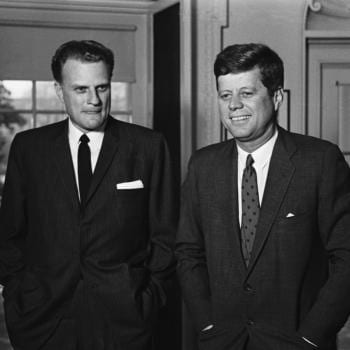The controversy over the papacy’s abduction of a Jewish boy, Edgardo Mortara, continues and reveals the ways in which Roman Catholics now have the liberty to do what Martin Luther could not do and remain in the church.
Two recent essays both take issue with the pope, Pius IX, the very same pontiff responsible for making papal infallibility a dogma, in ways that resemble Luther’s objections to Leo X.
Matthew Frank, for instance, sets himself up as the arbiter of Pius’ actions and draws on canon law and older theologians in ways remarkably similar to Luther:
Pius IX, who was beatified by Pope St. John Paul II in 2000 and may soon be canonized, had previously taken steps to relieve the Jews of Rome and the Papal States of much of the oppression under which they had long suffered. But Pius was wrong in the Mortara case—grievously so. . . .
The pope was wrong.
Even further back than Thomas Aquinas, the church has taught that it is wrong to baptize Jewish children against their parents’ wishes, much less to take them from their parents. Thomas himself, no modern liberal by any stretch of the imagination, describes it as an injustice to them, but adds that the reason is that “they would lose a father’s right over his now believing [Christian] children.” Does he mean more than a spiritual or moral right—that is, that parents could licitly be deprived of legal custody of their child by the temporal power of the state? That is not entirely clear. In the sequel Thomas writes, “in accord with natural law, a child, before he has the use of reason, is under the care of his father. Hence, it would be contrary to natural justice if, before a child has the use of reason, he were taken away from the care of his parents or something were ordained for him against his parents’ wishes.” Can baptism trump natural justice, or must it yield to it? Thomas does not say; we must puzzle it out for ourselves.
Aren’t Protestants the ones who are supposed to think things through for themselves?
Everything in the Mortara case was set in motion by the servant’s surreptitious baptism of Edgardo, which the church considered not only valid but licit (and still does) even in a case with unwilling parents because administered in extremis. As Cessario notes, “both the law of the Church and the laws of the Papal States stipulated that a person legitimately baptized receive a Catholic upbringing.” But he goes on to argue entirely from canon law and the sacramental character of baptism, without pausing to consider whether the civil law of the Papal States was unjust, particularly in its intransigent and, let us mince no words, brutal application to Mortara’s case.
The civil law that the papacy administered was unjust.
For Edgardo’s parents were alive, capable, and nonabusive. Nonetheless Cessario endorses the simple progression from a valid baptism, to the church’s duty to a young Christian, to Pius’s forcible seizure of Edgardo. But as Miller rightly notes, this rests on an erroneous view of the legitimate reach of state power. Pius wore two hats, the spiritual and the temporal, and, led astray by his sense of spiritual obligation to a baptized Christian, he wrongly used his temporal authority to snatch Edgardo from his family (and then compounded the injustice by raising the boy himself, without benefit of a married mother and father, as would be normal in a Catholic adoption).
Again, another assertion that the one officer with whom the deposit of faith’s buck stops was wrong in his understand of his authority.
How odd it is when Roman Catholics question the policies of the magisterium but Protestants are individualists and breed schism when they do the same. Of course, the Roman Catholics who think they know the church’s teaching better than the bishops are still IN the church (but OF it?), not in a separate communion. But surely Frank is smart enough to recognize that once the laity can call the bishops on church teaching and questions of authority, what’s left of the Roman Catholic Church is much closer to the Presbyterian Church in the U.S.A. than anything that resembles the universal communion over which Pius IX ruled.
From a different angle, Michael Sean Winters uses the controversy to blast First Things and its “conservative” Roman Catholics for being divisive. But even he can’t help but find his inner Protestant:
Apart from the pages of Communio, no Catholic editorial venue has more insistently resisted the reduction of our Christian faith to ethics than “Distinctly Catholic.” It is not enough that the kidnapping of Mortara was a moral enormity, although it was, as is Cessario’s defense of it. No, Cessario is no champion of the mysterious ways of God. His whole argument is premised on certain Thomistic understandings of how grace must work. It is he and his legalistic ilk who have gotten into this mess of thinking we can determine with precision where God’s grace goes and where it doesn’t. Forgetting the words of the Master to Nicodemus: “The wind blows where it wishes, and you hear its sound, but you do not know where it comes from or where it goes. So it is with everyone who is born of the spirit.” (John 3:8). Legalistic presumption, like moralism, strikes at God’s omnipotence and freedom and in seeking to overcome the latter idol, Cessario makes offering to the former, but it is a false god too.
The question that Winters does not address, though, is that Pius IX was within his rights, both on grounds of church teaching about baptism and the basis of his authority as pope, to do what he did in the case of Mortara.
When Luther pulled at the thread of Rome’s teaching and papal authority, he supposedly unraveled the quilt of Europe’s sacred canopy and disenchanted Christendom. Maybe all Christians are living in the light (or darkness) of that string-pulling. But if contemporary lay Roman Catholics have the power to challenge the papacy in the past — which is something that Luther did — what’s keeping them Roman Catholic other than their own understanding of the faith?
Protestants know that personal understandings of the faith are both divisive and important. For some reason, Roman Catholic critics of the papacy think they can have their own understanding of the faith and retain the authority of the hierarchy.
One word: wow!












